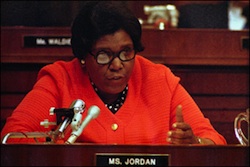‘This is what change looks like.” Reflecting on 13 months of rancor and preparing us for the months ahead making sense of it all, that’s what President Barack Obama told the nation from the White House East Room after the cliffhanger vote by the U.S. House passing the health care overhaul.
Undoubtedly overlooked by most, that statement struck me as profound and rocketed me back to 1992. The gods had smiled upon me, and I found myself at the LBJ School of Public Affairs, out of place among 10 promising graduate students chosen to take the last policy seminar taught by the late Barbara Jordan. The first African American elected to the Texas Senate since Reconstruction, Jordan went on to a distinguished career in Congress, ended her public service teaching at the LBJ School of Public Affairs.

U.S. Representative Barbara Jordan opens the impeachment hearings on July 25, 1974. Her brow remained unfurrowed during the electrifying eight-minute and 45-second speech.
I was old enough to be my classmates’ mom, but I was as bendable as a wire hanger. We studied policy from every conceivable angle, dissecting it into many parts — politics (not a dirty word), democratic pluralism, congressional prerogative, the U.S. Constitution, the presidency, leadership, vision, interest-group impact, agency roles in the policy process, the judiciary and more. To this day, Jordan’s reverence for our democracy is as ingrained within me as her conviction that public service is a high and honorable calling.
One important lesson we learned is that Americans are not comfortable with fundamental policy change, and that’s clearly been in evidence during the past year’s health care reform brawl. The nation has not legislated fundamental change since the 1960s, and, unaccustomed, emotions have run high.
Members of congress yelled “you lie” and “baby killer” from the chambers of the people’s House. Congressmen were spat upon and were the target of racial and homophobic epithets by angry protestors as they walked the steps to the Congress to cast their difficult votes.
After the bill was signed into law, all hell broke loose. Several representatives who voted for the bill have received death threats, profane voicemails, white powder mailed in envelopes and bricks hurled through their home and office windows with hateful notes attached. Three days after the vote, attorneys general from more than a dozen states, including Texas, filed suit asserting as unconstitutional the mandate for individuals to buy insurance.
The late Jake Pickle, who represented the 10th Congressional District from 1963 to 1995, knew firsthand about difficult votes. As a new congressman, he was confronted with the 1964 Civil Rights legislation. His constituency was bitterly divided on the issue. He knew in his heart that forbidding discrimination based on race and sex was the right thing to do. He also knew as a new congressman, a “yes” vote could well cost him his seat. He voted his conscience: “Aye.” He remembered that vote in his 1997 memoir, “Jake,” as his gutsiest, proudest moment in the U.S. Congress.
The health care legislation was never about socialism, red versus blue, a public option, abortion, government takeover, poll numbers or midterm election fallout. Those are all abstractions or side issues. All along, this legislation has been about uniting around the principle of equality, so that, like all other industrialized nations, in America health care will be available for everyone, not just the privileged.
In her keynote address to the National Democratic Convention in 1976, Jordan said with her voice and wisdom ringing from the mountain top, “First, we believe in equality for all and privileges for none … But this is the great danger America faces: that we will cease to be one nation and become instead a collection of interest groups — city against suburb, region against region, individual against individual. … But a spirit of harmony will survive in America … if each of us remembers, when self-interest and bitterness seem to prevail, that we share a common destiny.”
We also learned in Jordan’s class that true leadership is rare, that it requires a vision for the people along with the trust, skills, faith and perseverance to carry it out. How I wish she had lived to see a young visionary black senator swept into presidential office with the promise of “real” (meaning fundamental) change.
How proud the congresswoman would be that within 14 months of inauguration, Obama accomplished what three presidents had failed to do. Franklin Roosevelt, Harry Truman and Richard Nixon each placed universal coverage high on their agendas and fought valiantly for it. The late Sen. Edward Kennedy called it the last great unfinished business of our society.
The president rightly could have added to his remarks, “This is what leadership looks like.”

 Austin, Texas
Austin, Texas